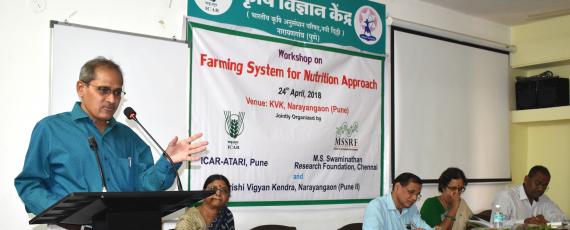Farming System for Nutrition demonstration models in Maharashtra – thanks to a LANSA ‘Champion’

Five villages in Wardha district (Vidarbha region), Maharashtra was one of the sites of the action research study by MSSRF from 2013-2018 to demonstrate feasibility of a farming systems approach to address the problem of undernutrition.The endline survey in 2017 showed evidence of improvement in dietary diversity; farm men and women have emerged as spokespersons, and shared their experience at block and district level forums. Farmers from another 16 villages have been motivated to practise FSN-promoted interventions. This grassroots-level uptake was as a result of intensive farmer-engagement, demonstrations, and exposure visits to build capacity. Coupled with nutrition education at individual, household, community and institutional levels, the FSN model was well received in its totality. This acceptance was also reflected at various levels of governance, leading to steps for extending the FSN approach to tackle undernutrition in more districts of Maharashtra state.
FSN champion lays a pathway to go forward
In July 2017, Dr. K Nagargoje, IAS, Director General of the Maharashtra Council of Agricultural Education and Research (MCAER) presided over a workshop organised by MSSRF in Pune, to disseminate the concept of Farming System for Nutrition (FSN) among district level officials from agriculture, horticulture and animal husbandry departments. MSSRF invited Dr Nagargoje to participate in the August 2017 regional consultation on FSN in Chennai; a key recommendation of the consultation was to set-up demonstrations of the FSN model in Krishi Vigyan Kendras (KVK)[1] under the Indian Council of Agricultural Research (ICAR). Later that year, he visited the FSN villages in Wardha, interacted with members of the village community and gave encouraging feedback.
Sustainable Impact for LANSA-MSSRF work in Maharashtra
In Maharashtra, four agriculture universities function under the auspices of MCAER, and Dr. Nagargoje convened a workshop with their representatives in December 2017. MSSRF was invited to make a presentation on the FSN model. Participants included Professor K P Vishwanatha, Vice Chancellor, Mahatma Phule Krishi Vidyapith, Rahuri, Dr. Lakhan Singh, Director, ICAR Agriculture Technology Application Research Institute (ATARI) – Pune, and Dr. Hingole, Director of Extension, Vasantrao Naik Marathwada Krishi Vidyapith, Parbhani, besides representatives from KVKs across the state and officials from MCAER. The concept of FSN was explained and MSSRF work under the LANSA programme was shared, specially the experiences with operationalising the FSN model and relevance of such approach in the wider setting of the undernutrition problem. The discussion led to a possibility of setting-up location specific FSN models in KVKs across Maharashtra to address the nutritional problems prevalent in each area.
Participants from KVKs engaged in group work at Workshop in April 2018.
Following up from this, Dr. Lakhan Singh convened a workshop with eleven selected KVKs from Maharashtra and Gujarat in April 2018 in collaboration with MSSRF, to orient them on setting-up FSN demonstration models in their campuses[2]. This is now part of the action plan of these KVKs for 2018-19. Recently, while speaking at a national consultation on Leveraging Agriculture for Nutrition in Chennai organised by MSSRF in Chennai on 29 July, 2018, Dr Singh informed that the participating KVKs have begun work on the demonstration models.
MSSRF is now in discussion with ICAR-ATARI, Pune to formalise this arrangement with a MoU to promote demonstration of the FSN model across all the 77 KVKs under it.
[1] Krishi Vigyan Kendra translates to ‘Farm Science Centre’; they are an integral part of the National Agriculture Research System under the Indian Council of Agricultural Research: https://kvk.icar.gov.in/aboutkvk.aspx








Add new comment